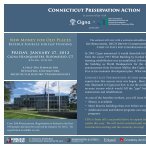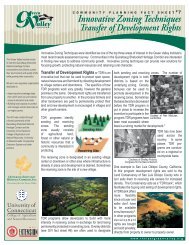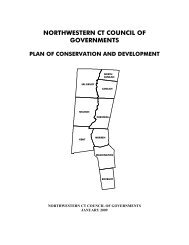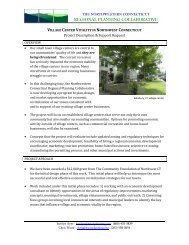I. GENERAL MUNICIPAL POWERSA. Connecticut Statutory ProvisionsCGS Section 7-34aCGS Section 7-148CGS Section 7-536CGS Section 8-306CGS Chapter 203CGS Section 12-494.CGS Section 12-504e.B. IntroductionSection 7-148 endows Connecticut municipalities with the power to “provide for the financing, construction,rehabilitation, repair, improvement or subsidization of housing for low and moderate income persons andfamilies.” While this expansive language seemingly provides towns with an unlimited range of options to financelocal affordable housing initiatives, in practice the courts have tended to limit towns to using only those methodsexplicitly provided for in the statutes. 1 The statutory provisions that authorize the general sources of municipalfinance, taxation, fees and borrowing, are described below.C. TaxationUnder Section 7-148(c)(2)(B) municipalities have the power to “assess, levy and collect taxes for general orspecial purposes on all property, subjects or objects which may be lawfully taxed” Courts have held thatConnecticut municipalities have no powers of taxation except those expressly given to them by the legislature, 2and that strict compliance with statutory provisions is a condition precedent to the imposition of a valid tax. 3Accordingly towns in Connecticut generally can assess, levy and collect only a handful of different taxes, the twomost significant in terms of revenue generation being: 1) property tax on real and certain personal property asprovided in Chapter 203 of the General Statutes, and 2) conveyance tax, which pursuant to Chapter 223 of the1 Capalbo v. Planning and Zoning Board of Appeals, 208 Conn. 480, 490, 547 A.2d 528 (1988); Blue Sky Bar, Inc. v.Stratford, 203 Conn. 14, 19, 523 A.2d 467 (1987); (“A municipality can exercise only such powers as are granted it or suchpowers as are necessary to enable it to discharge the duties and carry into effect the objects and purpose of its creation.”);New Haven Water Co. v. New Haven, 152 Conn. 563, 566, 210 A.2d 449 (1965). There may be exceptions to this rule, See,e.g., Gagne v. City of Hartford, 1994 Conn. Super. LEXIS 6 (upholding, as a valid exercise of the power to provide foraffordable housing under CGS Section 7-148, an ordinance requiring owners who converted residential units into nonresidentialuses, or who demolished residential housing, to either replace the converted or demolished housing stock withsimilar units or to make a contribution to the city's low income housing fund, despite), however a full analysis is beyond thescope of this report.2 Security Mills, Inc. v. Norwich, 145 Conn. 375, 377, 143 A.2d 451 (1958).3 Empire Estates, Inc. v. Stamford, 147 Conn. 262, 264-. 65, 159 A.2d 812 (1960).3
General Statutes, provides for payment to the Town Clerk of 0.25% 4 of the sales price of real property transferredwithin such town, or upon the change of use or classification of land within such town. 5D. BorrowingGenerallyUnder Section 7-148(c)(2)(I) & (J) a municipality is empowered to regulate the method of borrowing money forany purpose for which taxes may be levied; borrow on the faith and credit of the municipality for such general orspecial purposes and to such extent as is authorized by the general statutes; and provide for the temporaryborrowing of money.Furthermore, under the Connecticut Municipal Housing Finance Assistance Act (CGS Section 8-306), towns andcities in Connecticut may issue notes and bonds in such principal amounts as the legislative body shall determineto be necessary to provide sufficient funds for achieving the purposes of the Act, including the making ofmortgage loans and loans to lending institutions, the establishment of reserves to secure such notes and bonds,interest on such notes and bonds, and the payment of expenses incident to or necessary for operation of thehousing finance assistance plan.E. FeesAlthough the Connecticut General Statutes authorize the collection of fees by municipalities in numerousinstances, we have not found any statutory provisions explicitly permitting the imposition of such fees for theprovision of affordable housing. Under CGS Section 7-34a(e), however, $1 of every $30 dollars of fees receivedby a town clerk for each document recorded in the land records of the municipality can be used to pay for localcapital improvements as defined in CGS Section 7-536, which definition includes the development, renovation orimprovement to public housing projects.4 Several towns, including Hartford, New Haven and Bridgeport, are permitted to collect a conveyance tax of 0.5% of thesales price.5 See CGS Section 12.504(e) “Any land which has been classified by the owner as farm land pursuant to section 12-107c,forest land pursuant to section 12-107d, open space land pursuant to section 12-107e or maritime heritage land pursuant tosection 12-107g, if changed by him, within a period of ten years of his acquisition of title, to use other than farm land, forestland, open space land or maritime heritage land, shall be subject to said conveyance tax as if there had been an actualconveyance by him, as provided in sections 12-504a and 12-504b, at the time he makes such change in use.”4
- Page 1 and 2:
Preserving Salisbury’s Vitality:H
- Page 3 and 4:
Table of ContentsINTRODUCTION 4EXEC
- Page 5 and 6:
and retired business executives, te
- Page 7 and 8:
Executive SummaryA. FindingsSalisbu
- Page 9 and 10:
• Favor attached, multi-unit hous
- Page 11 and 12:
• Provide financing for the Salis
- Page 13 and 14:
People tend to have widely differin
- Page 15 and 16:
with incomes below $60,000. As a mo
- Page 17 and 18:
percent live outside Connecticut an
- Page 19 and 20:
number is achieved, the annual turn
- Page 21 and 22:
areas was increasing to the point w
- Page 23 and 24:
setbacks, and building envelopes th
- Page 25 and 26:
These two factors - diversity and c
- Page 27 and 28:
Exhibit 1: Index of Frequently Aske
- Page 29 and 30:
The Committee’s Work and Recommen
- Page 31 and 32:
Town houses, including row and cour
- Page 33 and 34:
Exhibit 2: Matrix of Incomes, Housi
- Page 35 and 36:
However, the likelihood of finding
- Page 37 and 38:
The Salisbury Tax Assessor’s offi
- Page 39 and 40:
3. Modify the existing Bed and Brea
- Page 41 and 42:
• Because private citizens, devel
- Page 43 and 44:
Exhibit 3: Draft Ordinance to Estab
- Page 45 and 46:
Exhibit 4: Draft Ordinance to Estab
- Page 47 and 48:
IV. FinanceThe Affordable Housing A
- Page 49 and 50:
about what housing its neighbors ne
- Page 51 and 52:
That the Salisbury Affordable Housi
- Page 53 and 54: District play in ensuring the Town
- Page 55 and 56: 2. Q: What is the evidence that Sal
- Page 57 and 58: older will almost triple from 751 i
- Page 59 and 60: Employer interviews. The authors of
- Page 61 and 62: details, please see the answer to Q
- Page 63 and 64: would be a cop-out to link the shor
- Page 65 and 66: of the school budget is provided fr
- Page 67 and 68: Starter (age 20-29) - 30 units spli
- Page 69 and 70: assessment, than privately construc
- Page 71 and 72: expanded exponentially. In fact, th
- Page 73 and 74: Appendix III: Sustainable Design Gu
- Page 75 and 76: Some other strategies that should b
- Page 82 and 83: Appendix V: Proposed Phase One Amen
- Page 84 and 85: transient visitors. This amendment
- Page 86 and 87: not a Special Permit application (a
- Page 88 and 89: designed to appear more like an acc
- Page 90 and 91: c. Revise subsection 718.3 to read:
- Page 92 and 93: Appendix VI: Cornwall, Connecticut
- Page 94 and 95: - Where the dwelling(s) are located
- Page 96 and 97: Appendix VIII: State and Federal Re
- Page 98 and 99: Small TownEconomicAssistance Progra
- Page 100 and 101: • single-room-occupancy• multif
- Page 102 and 103: Appendix IX: Statutory Sources of A
- Page 106 and 107: A. Connecticut Statutory Provisions
- Page 108 and 109: special exception or subdivision pl
- Page 110 and 111: III. TAX:ABATEMENTS, DEFERRALS AND
- Page 112 and 113: eighty per cent of the area median
- Page 114 and 115: • CGS Section 12-124 - “Allows
- Page 116 and 117: V. MISCELLANEOUSA. Impact (Linkage)


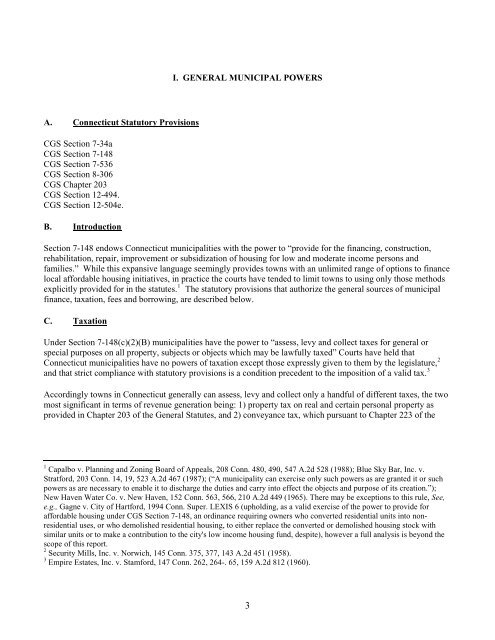
![Using GIS to Determine Horizon Belts[2]](https://img.yumpu.com/38917728/1/190x245/using-gis-to-determine-horizon-belts2.jpg?quality=85)
